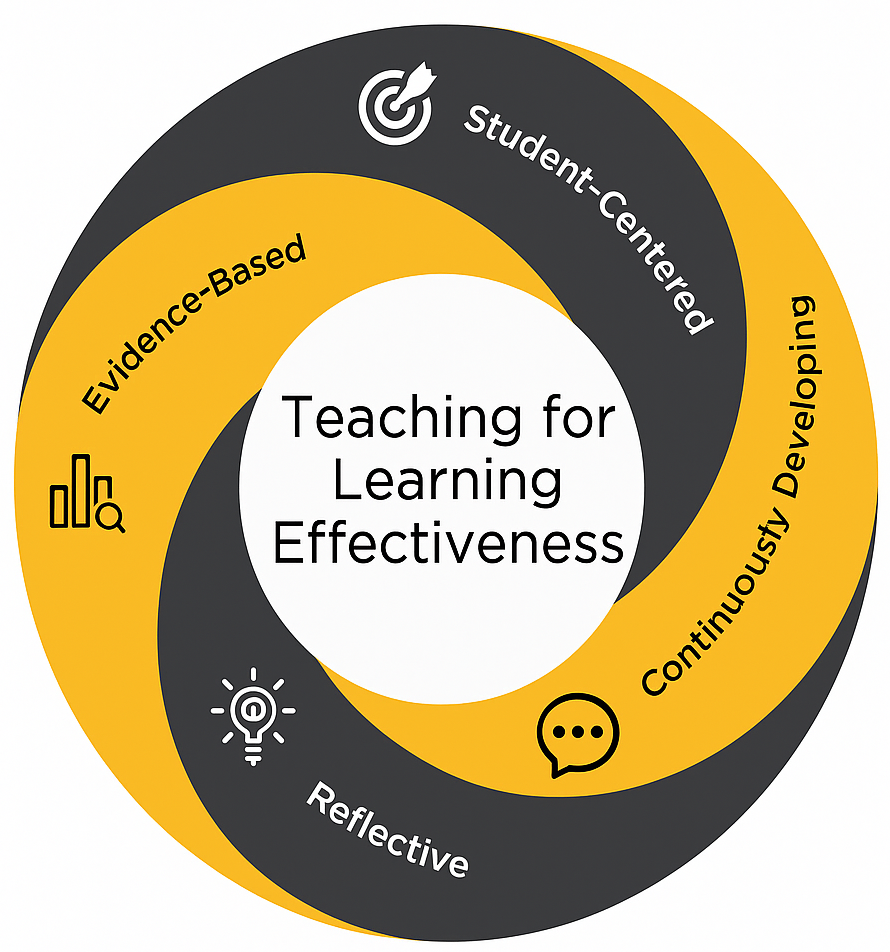
The Foundations of Effective Teaching are a set of first principles that are fundamental to the enterprise of teaching for learning as a whole. These Foundations establish that Effective Teaching involves four inherent characteristics.
Each of the four Foundations are explained briefly here. Each is accompanied by a sample of useful scholarly resources for further exploration. More sources are available on this site’s Resources page.
Effective Teaching is Evidence-Based
Teaching for learning practices should be grounded in the academic and practical scholarship of teaching. Effective teachers are scholars who observe and refine their own work based on professional inquiry into their teaching decisions and observed student outcomes.
Check out the following resources for more information, including relevant research findings and teaching strategies in course design and pedagogy:
Bishop-Clark, C., & Dietz-Uhler, B. (2012). Engaging in the scholarship of teaching and learning: A guide to the process, and how to develop a project from start to finish. Routledge.
Darby, F., & Lang, J.M. (2019). Small teaching online: Applying learning science in online classes. Jossey-Bass.
Eyler, J.R. (2018). How humans learn: The science and stories behind effective college teaching. West Virginia University Press.
Lang, J.M. (2021). Small teaching: Everyday lessons from the science of learning (2nd Ed.). Jossey-Bass.
Lovett, M.C., Bridges, M.W., DiPietro, M., Ambrose, S.A., & Norman, M.K. (2023). How learning works: Seven research-based principles for smart teaching (2nd Ed.). Jossey-Bass.
Effective Teaching is Student-Centered
As the purpose of teaching is student learning, teaching for learning practices should be considered first and foremost from the standpoint of the student learner. Effective teachers consider student learning objectives and outcomes as the primary basis for making decisions about course assessments, activities and learning materials. They also recognize that student experiences in the learning environment play a crucial role in whether they achieve those learning objectives and outcomes.
Check out the following resources for more information, including relevant research findings and teaching strategies in course design and pedagogy:
Blumberg, P. (2019). Making learner-centered teaching work: Practical strategies for implementation. Routledge.
Doyle, T. (2023). Helping students learn in a learner-centered environment. Routledge. (Original work published 2008)
Hoidn, S., & Klemenčič (Eds.) (2020). The Routledge handbook of student-centered learning and teaching in higher education. Routledge.
Tobin, T.J., & Behling, K.T. (2018). Reach everyone, teach everyone: Universal Design for Learning in higher education. West Virginia University Press.
Weimer, M. (2013). Learner-centered teaching: Five key changes to practice (2nd Ed.). Jossey-Bass.
Effective Teaching is Reflective
Teaching is an activity that cannot be separated from the subjective experience of the teacher. As scholarly educators we are also lifelong learners. As is the case for most any learner, what we know about effective teaching from our past experiences is built largely upon how we make sense of our previous experiences – both as teachers and as learners. Reflecting regularly and mindfully on our teaching practices provides us with valuable insights into our strengths, challenge areas, and opportunities for continued professional growth.
Check out the following resources for more information, including relevant research findings and teaching strategies in course design and pedagogy:
Ashwin, P., Boud, D., Calkins, S., Coate, K., Hallett, F., Light, G., Luckett, K., MacLaren, I., Martensson, K., McArthur, J., McCune, V., McLean, M. & Tooher, M. (2020). Reflective teaching in higher education (2nd Ed.). Bloomsbury Academic.
Brookfield, S.D. (2017). Becoming a critically reflective teacher (2nd Ed.). Jossey-Bass.
Light, G., Cox, R., & Calkins, S. (2009). Learning and teaching in higher education: The reflective professional (2nd Ed.). Sage Publications.
Osterman, K.F., & Kottkamp, R.B. (2015). Reflective practice for educators: Professional development to improve student learning. Skyhorse.
Palmer, P.J. (2017). The courage to teach: Exploring the inner landscape of a teacher’s life (20th Anniversary Ed.). Jossey-Bass.
Effective Teaching is Continuously Developing
The process of lifelong learning is never truly complete, and optimal teaching for learning is inherently an aspirational goal rather than a finite achievement. For these reasons, effective teaching for learning is the product of professional inquiry and dialogue aimed at continuing our growth and improvement as educators. Professional development takes many forms, from local workshops and seminars at the department or college level to conferences and symposia at the university, regional and national levels. In addition, as is the case in most areas of scholarship, the best discoveries for developing our teaching often emerge from the enriching informal conversations and mutual commitment to open, collaborative peer review we share with our colleagues.
Check out the following resources for more information, including relevant research findings and teaching strategies in course design and pedagogy:
Cox, M.D., & Richlin, L. (eds.) (2004). Building faculty learning communities. Jossey-Bass.
King, H. (2022). Developing expertise for teaching in higher education: Practical ideas for professional learning and development. Routledge.
McDonald, J., & Cater-Steel, A. (Eds.) (2017). Communities of practice: Facilitating social learning in higher education. Springer.
McDonald, J., & Cater-Steel, A. (Eds.) (2017). Implementing communities of practice in higher education: Dreamers and schemers. Springer.
Rienties, B., Brouwer, N., & Lygo-Baker, S. (2013). The effects of online professional development on higher education teachers’ beliefs and intentions towards learning facilitation and technology. Teaching and Teacher Education, 29, 122–131. DOI: 10.1016/j.tate.2012.09.002